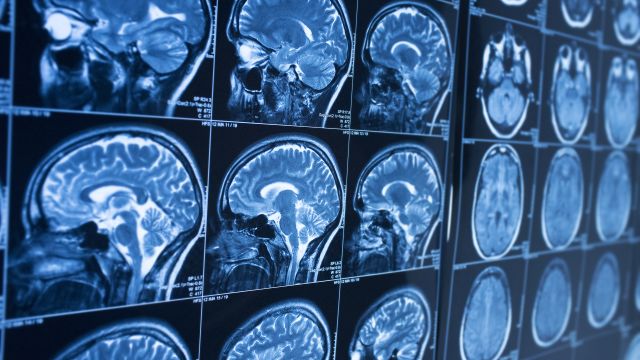Updated on February 10, 2025.
Alzheimer’s disease is a brain disease that progresses slowly and affects memory, thinking, and behavior. If you suspect that you or a loved one has Alzheimer's of if you've recently received a diagnosis, it’s understandable you may be worried. Here's how to better understand the condition so you can get the help you need.
Causes of Alzheimer's disease
Typically, Alzheimer’s affects people ages 65 and older. But rarely, some people develop early-onset Alzheimer’s between 30 to 60 years of age. (Less than 10 percent of all Alzheimer's cases are believed to be early-onset.)
A clear cause of Alzheimer’s hasn’t yet been identified, but experts believe a combination of aging, genes, lifestyle, and environmental factors contribute to the development of the disease. A certain type of genetic mutation is believed to be the cause of early-onset Alzheimer’s.
While it’s not always the case, older people with a condition called mild cognitive impairment (MCI) have a greater risk of developing Alzheimer’s. MCI is a small decline in mental abilities compared with people of the same age.
Symptoms of Alzheimer's disease
Alzheimer’s affects everybody differently, but memory issues and a decline of basic cognitive functions like reasoning and judgment are generally the first signs of the disease.
Symptoms of Alzheimer’s move through stages. These include mild, moderate, and severe Alzheimer’s (also described as early, middle, and late-stage disease). A person with early-stage, or mild, Alzheimer’s is still able to function independently, but they may have trouble remembering certain words or where everyday objects are located. Signs of mild Alzheimer’s include:
- Problems remembering common words or names
- Wandering off and getting lost
- Difficulty handling money
- Trouble planning, organizing, and performing everyday tasks
- Repeating questions
Moderate Alzheimer’s tends to last the longest and bring on the most changes. Signs include:
- Greater memory loss, including forgetting one’s past and having trouble recognizing family and friends
- Problems learning how to do new things
- Confusion about where they are or what day it is
- Difficulty carrying out multi-step tasks
- Mood, personality, and behavior changes, including being suspicious, delusional, compulsive, or repetitive
- Changes in sleep patterns, such as sleeping during the day and being up at night
People with severe, or late-stage, Alzheimer’s lose the ability to respond to their surroundings, to communicate and, eventually, to control movement, such as walking and swallowing. They are totally dependent on a caregiver and require round-the-clock care.
Alzheimer’s treatments
While there isn’t a cure for Alzheimer’s, there are treatments that can help ease symptoms and possibly slow disease progression. Medications commonly used may include:
- Cholinesterase inhibitors like galantamine, benzgalantamine, rivastigmine, and donepezil. These can help limit the breakdown of a compound in the brain that may be key to thinking and memory, called acetylcholine.
- N-methyl-D-aspartate (NMDA) antagonists like memantine. These may help regulate a brain chemical called glutamate, too much of which can lead to the death of brain cells.
- Immunotherapy drugs like lecanemab and donanemab. They boost the immune system to help slow the disease.
- The atypical anti-psychotic brexpiprazole helps to treat agitation linked to Alzheimer’s.
Life expectancy
On average, a person with Alzheimer’s lives four to eight years after being diagnosed. However, some people can live as long as 20 years with the disease.
Current research
There are many studies underway to help determine the causes, progression, and treatments of Alzheimer's disease. Researchers are continuing to look for treatments that better target the disease process itself, as well as trying to find ways to identify the brain changes early and intervene before they progress to Alzheimer’s.
Resources
To learn more about Alzheimer's disease, visit the Alzheimer’s Association, the National Institute on Aging, and the Alzheimer’s Foundation of America.







